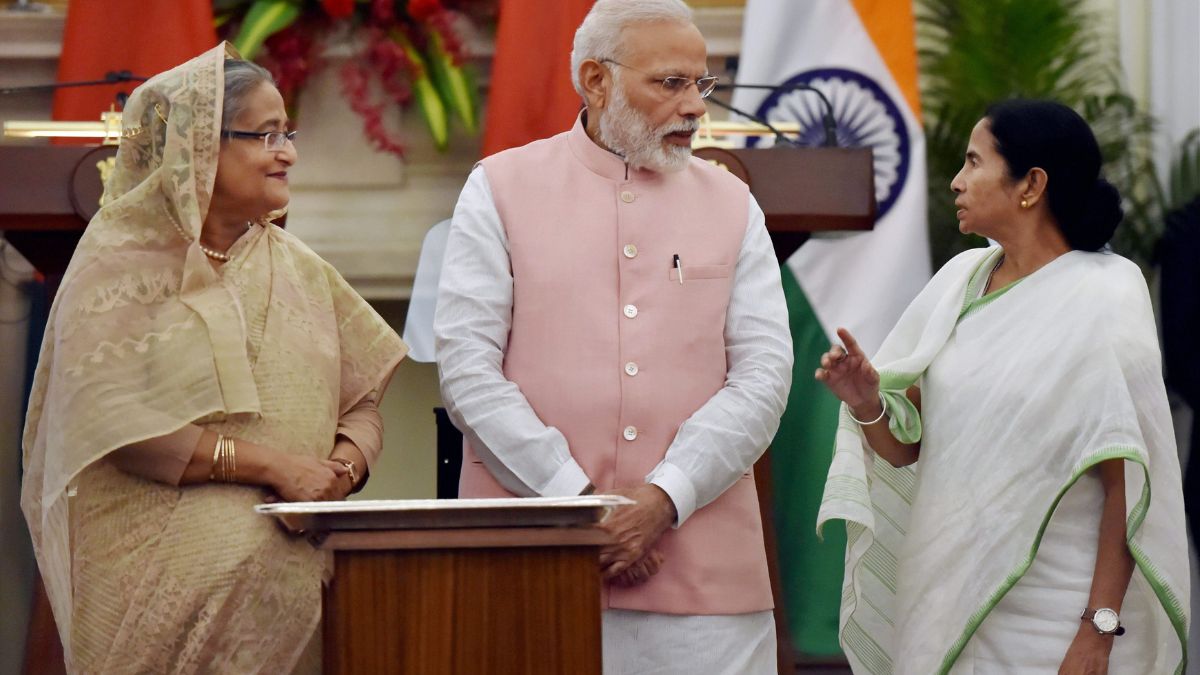A row has erupted between the Centre and the West Bengal government over water-sharing talks with Dhaka. The rift stems from Bangladesh Prime Minister Sheikh Hasina’s visit to New Delhi last week during which she held bilateral talks with her Indian counterpart Narendra Modi on River Teesta and the 1996 Ganga Water Treaty.
On Monday (24 June), West Bengal chief minister Mamata Banerjee expressed anguish for not being included in the discussions with Bangladesh. However, the Centre has rebuffed her claims of not being consulted over the issue.
Let’s take a closer look.
Mamata Banerjee’s letter to PM
CM Banerjee wrote a letter to PM Modi expressing “strong reservation” over the alleged exclusion from the talks with Bangladesh on Teesta water sharing and the 1996 Farakka Treaty.
“I am writing this letter in the context of the recent visit of the Prime Minister of Bangladesh. It seems that water-sharing issues relating to the Ganges and Teesta rivers may have been discussed during the meeting. Such unilateral deliberations and discussions without consultation and the opinion of the state government is neither acceptable nor desirable,” she said in a three-page letter.
She urged the PM not to hold such discussions with Dhaka without involving the West Bengal government.
Banerjee also highlighted Bengal’s close ties to Bangladesh – geographically, culturally, and economically.
Impact Shorts
More ShortsShe said that the people of her state would be the “worst sufferers” of any pacts on water sharing. “I would like to bring to your notice that river morphology has changed in the eastern part of India and Bangladesh over many years which has deprived West Bengal and negatively impacted the water availability in the state,” she added.
On Saturday (22 June), Hasina and Modi held talks on the conservation and management of River Teesta and the continuation of the 1996 Ganga Water Treaty.
The Indian premier said a technical team would visit Bangladesh soon to explore the conservation and management of the Teesta River. He also said the two countries will kickstart technical-level talks for renewing the Ganga water treaty.
India and Bangladesh signed the Ganges Water Sharing Treaty in 1996 on the sharing of the Ganges waters at Farakka. The pact is set to expire on 12 December 2026.
Centre rejects CM Banerjee’s claims
The Central government has denied Banerjee’s claim of being excluded from the water-sharing talks with Bangladesh.
Central government sources told News18 that the state government was notified about the discussions with Dhaka.
According to the sources, the West Bengal government was part of the review process regarding the Ganga water treaty.
Last July, the Centre asked Bengal for a nominee for the panel tasked with reviewing the 1996 India-Bangladesh Treaty. In August of that year, Banerjee’s government nominated the Chief Engineer (Design and Research) at the Irrigation and Waterways Directorate for the committee, sources told Times Now.
As per News18 sources, the West Bengal government was an active participant in the discussions and provided important data needed for the renewal of the 1996 Ganga Water Treaty. In April, they said, Biplab Mukhopadhyay, Joint Secretary of the Irrigation & Waterways Department, kept forward West Bengal’s demand for domestic and industrial water for the next 25-30 years.
“These actions unequivocally show that the Government of West Bengal was kept well-informed and actively involved in the treaty review and renewal process,” News18 cited the Central government sources as saying.
ALSO READ: India offers support for Teesta river reservoir in Bangladesh amid bilateral talks
Why a Teesta water-sharing treaty remains elusive
India and Bangladesh share 54 rivers flowing from the Himalayas to the Bay of Bengal.
The Ganga and the Brahmaputra (known as Jamuna in Bangladesh) are the largest rivers the two countries share. The Teesta is a tributary of the Brahmaputra, cascading from Sikkim and West Bengal before entering Bangladesh.
Talks between the two countries over the sharing of Teesta waters went on for decades, without much progress until 2011.
According to the pact, discussed under the Manmohan Singh-led UPA government, India would get 42.5 percent of the Teesta’s waters and Bangladesh 37.5 percent during the dry season.
Bangladesh’s farmers have long flagged the shortage of water in the winter months.
However, the 2011 agreement had to be shelved after Bengal CM Mamata Banerjee refused to sign, saying the pact would be against the interest of her state’s farmers, reported Outlook.
As her Trinamool Congress (TMC) was a key coalition partner of the UPA government and water is a state issue, the deal fell through due to Banerjee’s disapproval, according to an Observer Research Foundation (ORF) article.
The Teesta water-sharing agreement between India and Bangladesh has been waiting to be signed since 2011.
The renewed talks on Teesta assume significance amid China showing interest in the river. As per Outlook, Beijing had proposed to dredge and embank a portion of the Teesta river but New Delhi opposed the project due to security concerns. Bangladesh’s Hasina has not given a nod to China’s plans yet.
With input from agencies
)